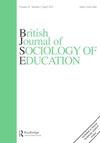Study gods – How the new Chinese elite prepare for global competition
IF 2.1
3区 教育学
Q1 EDUCATION & EDUCATIONAL RESEARCH
引用次数: 0
Abstract
The sociology of education as a field has contributed significantly to understanding how social inequalities are replicated, promoted and inter-generationally sustained in education systems. Scholars have explained how this occurs through everyday education processes and education practices. Over the years, we see this understanding developed through the theories such as Class, Codes and Control by Basil Bernstein (1977) and subsequently through the theorising of socio-educational inequality from the lens of Capital and Class Distinction by Pierre Bourdieu (1984). Much of this empirical investigation and conceptual theorising has been limited to understanding educational inequalities in anglophone countries, focusing particularly on the citizens of these nations. As such, we don’t know much about what is happening in, for example, non-anglophone and Asian countries (with a few exceptions, see for example, Carrasco et al. 2021; Gupta 2020; Xu & Montgomery, 2021) and among those who hold citizenships of these countries but frequently move around, living and working transnationally during their life course. Yi-Lin addresses the latter in Study Gods. In this book Yi-Lin Chiang documents crucial events occurring in the lives of 28 elite students between 2012 and 2019, to demonstrate the ways in which the new Chinese elite students prepare for global competition, thus maintaining their ultra-privileged social status. Although the author documents these education-related events in the lives of Study Gods as mundane, they simultaneously clarify that while these events may be ‘everyday’ for the Study Gods and their peers, these are inherently classed and exclusive to this specific group of elites, thus alluding to the extent of educational—and by extension, social—inequalities in China. The book is organised across six chapters covering different topics—each of these topics offers unique insights into the lives of and the making of China’s global elite. Chapter one looks at the role of the education system in preparing the global elite in China. It provides insights into how specific groups of schools appeared to become ‘training grounds’ for a selective group of students and how students in these schools are uniquely prepared to take up their place in typically highly competitive elite higher educational institutions. The concept of training here was particularly interesting as it demonstrates the significance of hidden curricula that specific schools follow because not only are they educating children academically, but this education involves deliberate and careful preparation to help pupils occupy high-status positions in the future (this resonates with cases in India, see for example, Rizvi, 2015). Here we also get a glimpse of how high the stakes are with exams for the students studying in these elite schools, encapsulated in the ways in which students ‘believed that high scores on these [college entrance tests such as Gaokao and SAT] tests, which led to top university placement, were tickets to engaging in global elite status competition’ (p.37). Interestingly we witness the politics of shadow education: many of these students can afford high-quality and remarkably expensive private tutoring to facilitate the transition from school to higher education. This observation signals that there is not just disparity at the school level between the privileged and disadvantaged groups but also in the form of outside-school shadow education—a feature which has also been observed among new middle classes in India (see for example Gupta, 2023). Review Symposium研究神——中国新精英如何为全球竞争做准备
教育社会学作为一个领域,对理解社会不平等如何在教育系统中被复制、促进和代际维持作出了重大贡献。学者们通过日常教育过程和教育实践解释了这是如何发生的。多年来,我们通过巴兹尔·伯恩斯坦(1977)的《阶级、代码和控制》等理论,以及随后皮埃尔·布迪厄(1984)从《资本和阶级区分》的视角对社会教育不平等进行理论化,看到了这种理解的发展。这些实证调查和概念性理论的大部分都局限于理解英语国家的教育不平等,尤其关注这些国家的公民。因此,我们对诸如非英语国家和亚洲国家的情况了解不多(除了少数例外,参见Carrasco et al. 2021;古普塔2020年;Xu & Montgomery, 2021),以及那些拥有这些国家的公民身份,但在他们的一生中经常四处走动,在跨国生活和工作的人。以临在《学神》中提到了后者。在这本书中,蒋宜林记录了2012年至2019年间28名精英学生生活中的重要事件,展示了中国新一代精英学生为全球竞争做准备的方式,从而保持了他们的超特权社会地位。虽然作者将这些与学习之神生活有关的教育事件记录为平凡的,但他们同时澄清,尽管这些事件对学习之神和他们的同龄人来说可能是“日常”的,但这些事件本质上是被分类的,是这一特定精英群体所独有的,因此暗指中国教育的程度,进而延伸到社会的不平等。这本书分为六个章节,涵盖了不同的主题,每个主题都提供了对中国全球精英生活和塑造的独特见解。第一章着眼于教育系统在中国培养全球精英中的作用。它提供了对特定学校群体如何成为精选学生群体的“训练基地”的见解,以及这些学校的学生如何为进入典型的高度竞争的精英高等教育机构做好独特的准备。这里的培训概念特别有趣,因为它展示了特定学校遵循的隐藏课程的重要性,因为他们不仅在学业上教育孩子,而且这种教育包括深思熟虑和仔细的准备,以帮助学生在未来占据高地位(这与印度的案例产生共鸣,例如,Rizvi, 2015)。从这里我们也可以看到,对于在这些精英学校学习的学生来说,考试的风险有多高,这体现在学生们认为,在高考和SAT等大学入学考试中取得高分,就能进入顶尖大学,是参与全球精英地位竞争的入场券。有趣的是,我们目睹了影子教育的政治:这些学生中的许多人能够负担得起高质量和非常昂贵的私人辅导,以促进从学校到高等教育的过渡。这一观察结果表明,特权群体和弱势群体之间不仅在学校层面存在差异,而且在校外影子教育的形式中也存在差异——这一特征也在印度的新中产阶级中被观察到(例如,参见Gupta, 2023)。审查研讨会
本文章由计算机程序翻译,如有差异,请以英文原文为准。
求助全文
约1分钟内获得全文
求助全文
来源期刊
CiteScore
3.70
自引率
9.50%
发文量
74
期刊介绍:
British Journal of Sociology of Education is one of the most renowned international scholarly journals in the field. The journal publishes high quality original, theoretically informed analyses of the relationship between education and society, and has an outstanding record of addressing major global debates about the social significance and impact of educational policy, provision, processes and practice in many countries around the world. The journal engages with a diverse range of contemporary and emergent social theories along with a wide range of methodological approaches. Articles investigate the discursive politics of education, social stratification and mobility, the social dimensions of all aspects of pedagogy and the curriculum, and the experiences of all those involved, from the most privileged to the most disadvantaged. The vitality of the journal is sustained by its commitment to offer independent, critical evaluations of the ways in which education interfaces with local, national, regional and global developments, contexts and agendas in all phases of formal and informal education. Contributions are expected to take into account the wide international readership of British Journal of Sociology of Education, and exhibit knowledge of previously published articles in the field. Submissions should be well located within sociological theory, and should not only be rigorous and reflexive methodologically, but also offer original insights to educational problems and or perspectives.

 求助内容:
求助内容: 应助结果提醒方式:
应助结果提醒方式:


